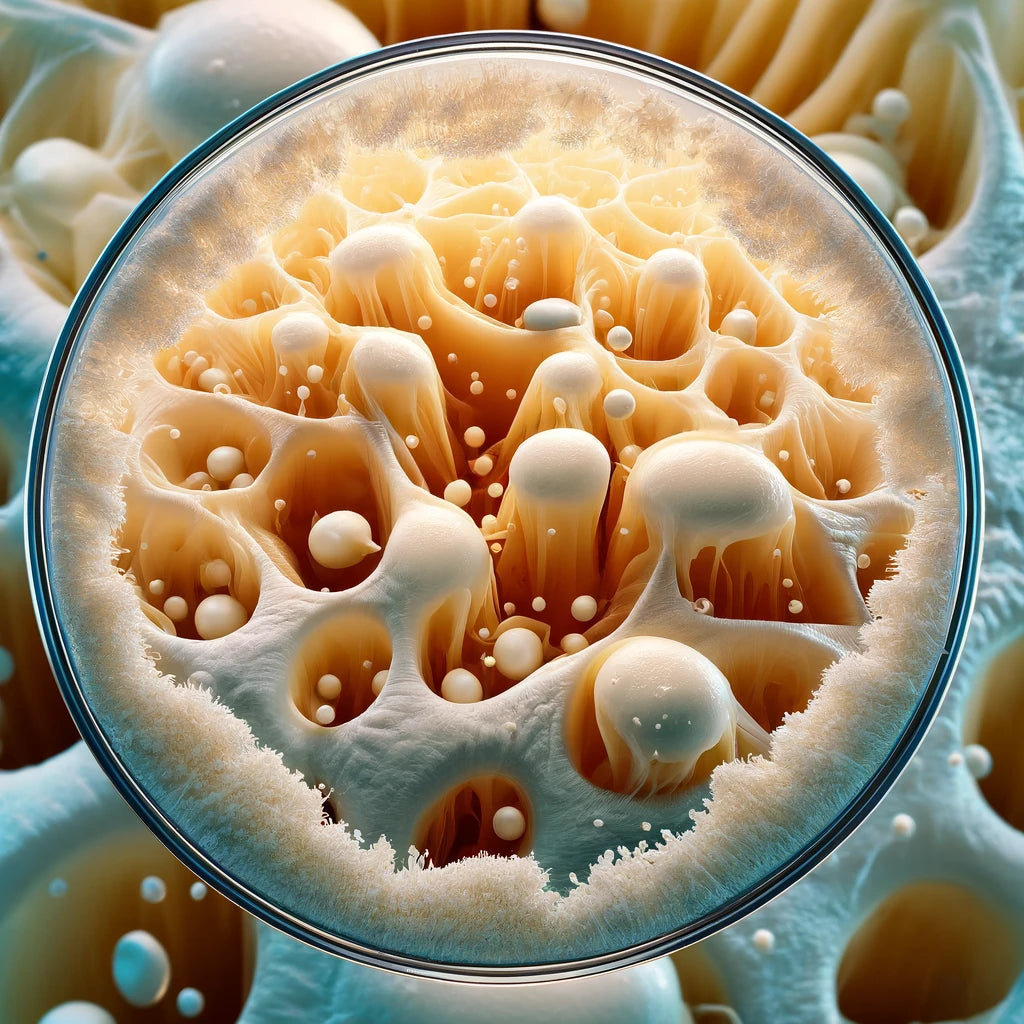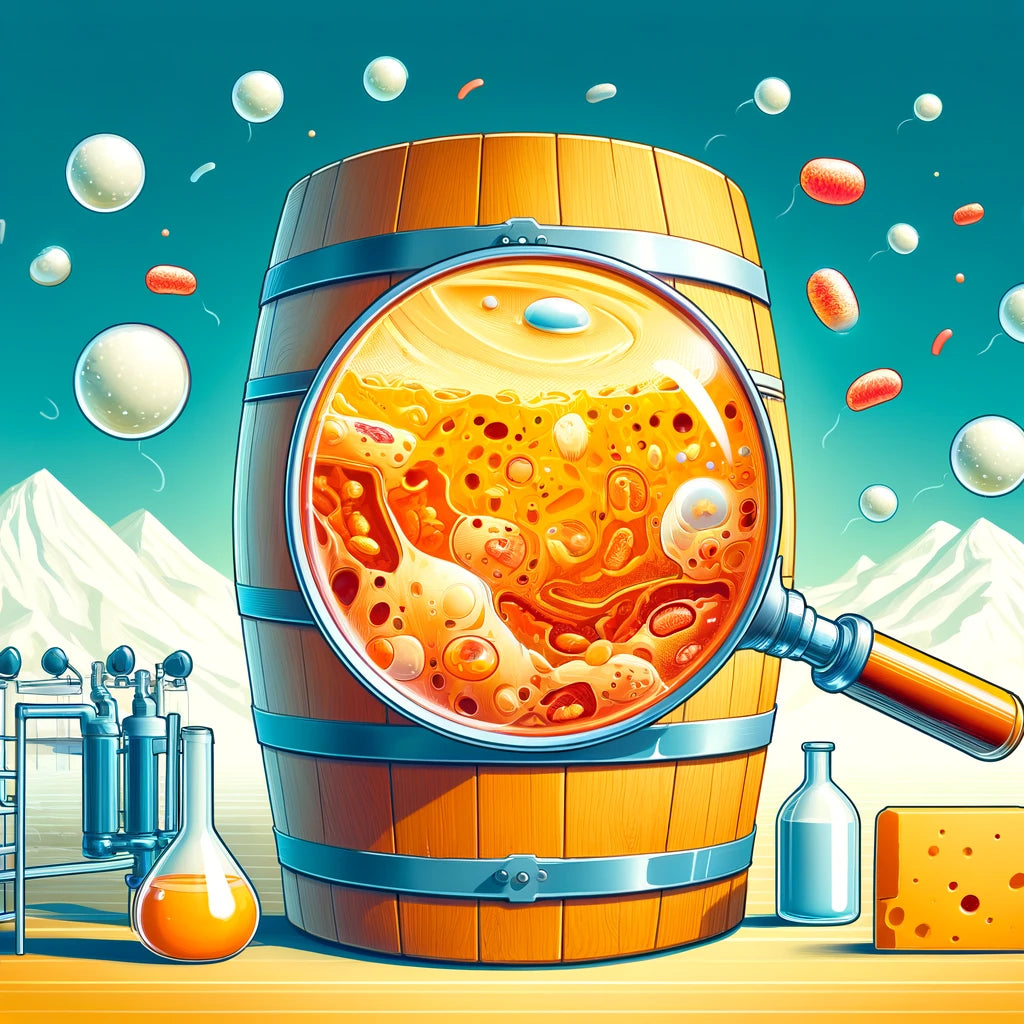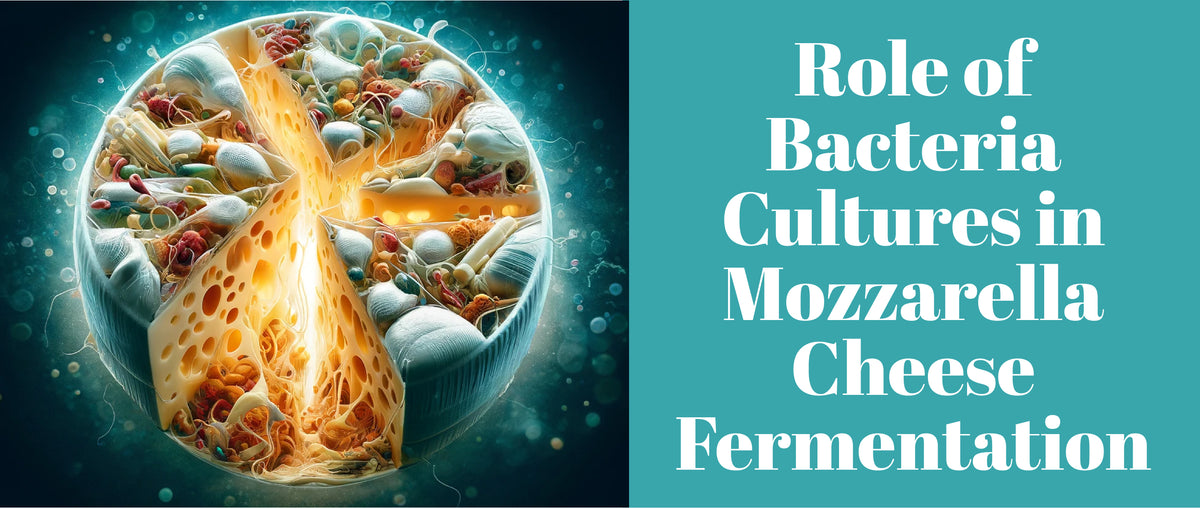Role of Bacteria Cultures in Mozzarella Cheese Fermentation
Key Takeaways
- Bacteria Cultures are Crucial for Mozzarella Cheese Fermentation.
- Selection of Bacterial Strains Influences Cheese Quality
- Fermentation Bridges Traditional and Vegan Cheese Production
- Health Benefits of Bacteria in Cheese.
- Vegan Cheeses Offer Nutritional Advantages.
- Innovation and Sustainability in Cheese Making.
- Culinary and Cultural Significance of Fermented Cheeses.
The Intriguing Role of Bacteria Cultures in Mozzarella Cheese Fermentation
Mozzarella cheese, with its delicate flavour and stringy texture, is not just a key ingredient for pizza lovers but also a culinary delight celebrated worldwide. This cheese's journey from milk to the dining table is a fascinating tale of tradition, science, and the subtle art of cheese-making, largely driven by the unsung heroes of the process: bacteria cultures. As we explore the role of these microorganisms in mozzarella cheese fermentation, we also delve into the burgeoning interest in vegan cheese and plant based cheese alternatives, reflecting the evolving dietary preferences of consumers seeking Vegan products.
The Science of Cheese Fermentation
The magic of mozzarella lies in its fermentation, a process primarily facilitated by bacteria such as Lactobacillus and Streptococcus. These bacteria play a pivotal role in transforming the lactose in milk into lactic acid, thereby altering the milk's pH and setting the stage for cheese formation. Fermentation not only impacts the cheese's texture and flavor but also contributes to its safety and shelf-life.

The Art of Selection: Crafting Flavors and Textures
Selecting the right bacterial strains is akin to an art form, where the cheese-maker's skill in balancing environmental conditions like temperature, pH, and moisture ensures the development of desired flavors and textures. This meticulous attention to microbial ecosystems allows for the production of Unprocessed Cheese, retaining the originality and richness of flavors intended by nature.
Environmental Conditions: The Crucial Factors
The environment in which cheese fermentation takes place can make or break the final product. Factors such as temperature, pH levels, salt concentration, and moisture content are meticulously managed to foster the perfect conditions for bacteria to do their work. It's a delicate balance, as the same bacteria that produce the creamy texture of mozzarella can lead to vastly different outcomes under slightly altered conditions.
Vegan Alternatives: A New Frontier
As the demand for vegan products surges, the quest for vegan cheese that mimics the taste and texture of traditional mozzarella has intensified. Innovations in plant-based cheese utilize microbial cultures derived from plant sources, providing a sustainable and cruelty-free alternative to dairy-based products. Cashew Butter and coconut oil are often employed as bases for Vegan Cheese, offering a rich, creamy texture reminiscent of the dairy-based original. Moreover, these vegan products, including vegan butter and Fat Free Butter alternatives like garlic butter and unsalted butter, cater to a wider audience, including those with dietary restrictions or ethical concerns regarding animal welfare.
The Health Perspective: Bacteria as Benefactors
Beyond their role in fermentation, the bacteria cultures in cheese contribute to its health benefits. Certain strains involved in cheese-making are probiotic, offering potential advantages for gut health, immunity, and overall well-being. This aspect of cheese fermentation aligns with the increasing consumer interest in functional foods that support health beyond basic nutrition.
Mozzarella and Beyond: The Evolution of Cheese
As we appreciate the complex interplay of microbes in cheese-making, it's clear that the art and science of fermentation are not just about preserving food but also about enhancing its nutritional and sensory properties. The exploration into fat-free cheese and parmesan cheese variants further illustrates the versatility of fermentation techniques, catering to diverse tastes and dietary needs.
Fermentation: Bridging Tradition with Vegan Innovations
In the realm of vegan cheese and plant-based cheese alternatives, fermentation plays a pivotal role in achieving the desired taste and texture that closely mimics that of traditional dairy cheeses. The process involves using specific strains of bacteria, yeast, or molds that are vegan-friendly, to ferment the primary ingredients of vegan cheeses, such as nuts, soy, or root vegetables. This not only helps in developing the complex flavors and textures but also contributes to the nutritional profile of the final product.
Vegan Mozzarella: A Case Study
Consider the case of vegan mozzarella, which has gained popularity among consumers seeking dairy-free vegan products. The production process often involves blending soaked cashews to create a creamy base, which is then fermented with bacterial cultures to introduce the characteristic tangy flavor of traditional mozzarella. This innovative use of fermentation underscores the versatility and adaptability of age-old techniques to meet modern dietary preferences.
The Health Benefits of Bacteria in Cheese
While the role of bacteria in developing flavor and texture in cheese is well-known, their health benefits are equally noteworthy. Traditional dairy cheeses are rich in probiotics, particularly those fermented with live cultures. These beneficial bacteria can improve gut health, boost the immune system, and may even have positive effects on mental health.
Probiotics in Cheese: Beyond Gut Health
- Digestive Wellness: The live cultures found in fermented cheeses aid in digestion and can help balance the gut microbiome, promoting overall gut health.
- Immune Support: Probiotic bacteria bolster the immune system, making the body more resilient against infections.
- ental Health Benefits: Emerging research suggests a link between gut health and mental well-being, with probiotics playing a potential role in reducing anxiety and improving mood.

Vegan Cheese and Health: A New Frontier
The health benefits associated with bacterial cultures in cheese are not limited to dairy-based products. Vegan cheeses that undergo fermentation with specific bacterial strains can also offer probiotic benefits. This represents an exciting area of growth in the development of vegan products, where health and flavour converge.
Nutritional Advantages of Vegan Cheeses
- Lactose-Free: Vegan cheeses provide a safe and delicious alternative for those with lactose intolerance or dairy allergies.
- Cholesterol-Free: Plant-based cheeses typically contain no cholesterol, making them a heart-healthy option.
- Rich in Nutrients: Depending on the base ingredients used, vegan cheeses can be rich in essential nutrients such as vitamins, minerals, and healthy fats, especially when made from nuts like cashews or almonds.
Conclusion: The Future of Fermentation in Cheese Making
As we explore the intersections of tradition, innovation, and health in the world of cheese making, it's clear that fermentation remains at the heart of this culinary art. Whether through the time-honored practices of producing traditional mozzarella or the pioneering methods behind vegan cheese and plant-based cheese alternatives, the role of bacteria cultures is indispensable.
The continued exploration of fermentation techniques not only promises to enhance the sensory and nutritional qualities of cheese but also to expand the possibilities for inclusive, sustainable food choices. As we look to the future, the fusion of science, tradition, and creativity in cheese making continues to offer exciting opportunities for discovery and delight.
In embracing both the legacy and potential of fermentation, we find a delicious symbol of the harmony between human ingenuity and the natural world, a reminder of the shared joy and nourishment food brings to our lives. Whether you're a connoisseur of Unprocessed Cheese, a fan of fat-free cheese, or an enthusiast of vegan butter and garlic butter, the world of fermented cheeses offers a rich tapestry of flavours, textures, and benefits to explore and enjoy.








